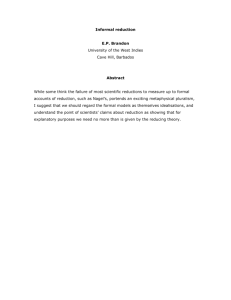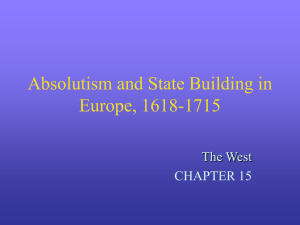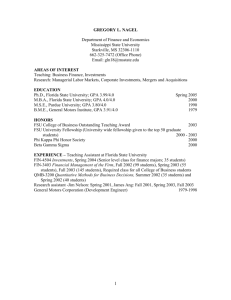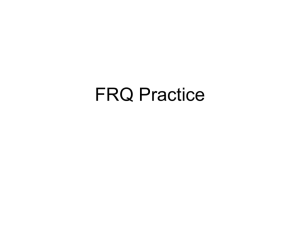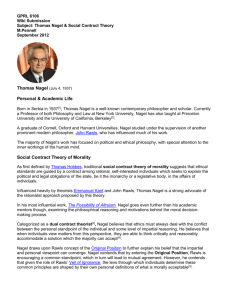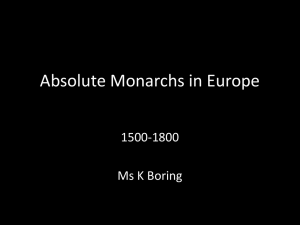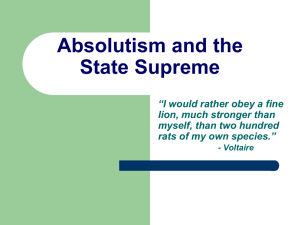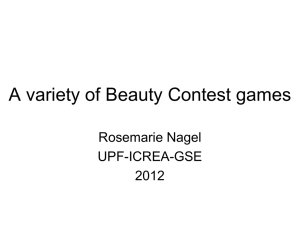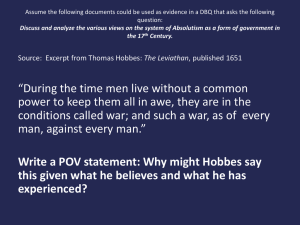Nagel War and Massacre - Honors290-f12
advertisement
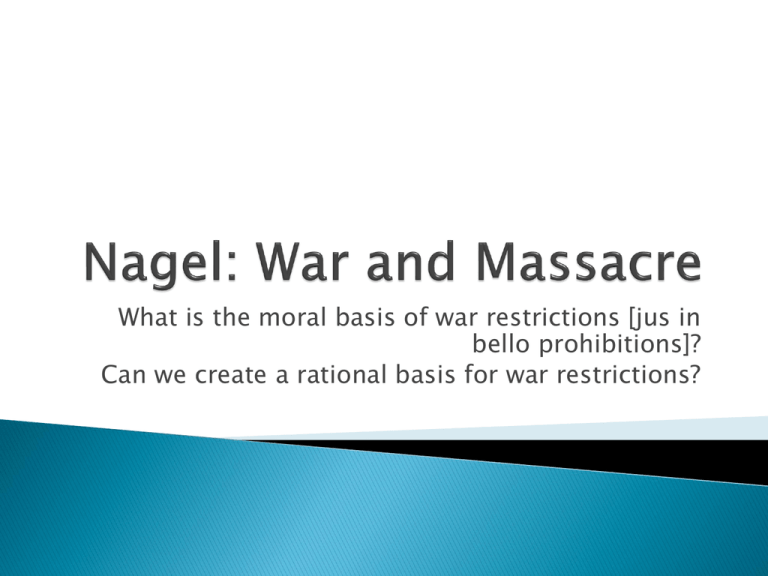
What is the moral basis of war restrictions [jus in bello prohibitions]? Can we create a rational basis for war restrictions? US soldiers killed about 500 unarmed civilians in March of 1968. Women, children and the elderly were murdered. Some women were raped, bodies were mutilated. The massacre was covered up until a soldier reported it to public officials. 33 of the 150 soldiers were thought to be responsible. 13 were tried, only one convicted (Lt. Calley) He was charged with murdering 104 villagers. He served 3 ½ years and was pardoned by Nixon but later apologized for the massacre. If the war was wrong to begin with, then everything done at My Lai was wrong. There was an ‘apathetic’ reaction in the US to the massacre. The Vietnam War “has revealed attitudes of a more general kind, that influenced the conduct of earlier wars as well…It is not easy to keep a firm grip on the idea of what is permissible in warfare because while some military actions are obvious atrocities, other cases are more difficult to assess.” (p. 124) What cases might he refer to? What is the difference between the ‘difficult’ cases and the ‘easy’ cases? One view: There are restrictions on the means that can justifiably be pursued to achieve a good end. If it takes torture or destroying a village to end a terrorism campaign one must not do that. A conflict between utilitarianism and absolutism Utilitarianism=The right action is the action that promotes the best consequences. Nagel “gives primacy to a concern with what will happen.” (124) Absolutism is concerned “with what one is doing.” It forbids certain actions to promote good ends. We utilize consequentialist-type thinking all the time, and try to maximize good outcomes. The moral theory says that it is the right thing to do. [Utilitarianism will generally say good consequences are some element of subjective mental states or welfare—such as happiness.] The right thing to do is to do that thing that will maximize good consequences more than any other thing one could do. It is to “maximize good and minimize evil.” (p. 125) Pacifism can be a form of absolutism—We may never kill another person. [I.e., there are no exceptions.] GE Anscombe is a renowned advocate of this view in “Mr. Truman’s Degree.” In the Vietnam War, there were many cases of violations of absolutist principles—e.g., “the deliberate killing of the harmless, civilians, prisoners of war, and medical personnel…” Nagel says “many people feel…that something has gone seriously wrong when certain measures are admitted into consideration in the first place…” [Kant’s theory is absolutist when it comes to violating the categorical imperative or treating others as means only and not as ends.] The absolutist says there are some things we can never justify in terms of consequences. We can’t do one evil to prevent a thousand evils. [Ends=goals/Means=method whereby one achieves those goals] We will be torn, Nagel thinks, between both utilitarian and absolutist reasons. Note that consequentialism/utilitarianism does not mean that one can do anything to achieve a singular desirable goal because one must look to long term consequences. Rule-consequentialism [Rule utilitarianism] might argue that one should always follow jus bello rules of war. Nagel: “Utilitarianism certainly justifies some restrictions…” Absolutist prohibitions are about what one does, deliberately. [E.g., it can’t be ‘you may never allow the death of innocent people’ because sometimes no matter what you do, innocent people will die—e.g., if you don’t violate other rules and bomb a village, a terrorist might go on to kill innocents elsewhere.] So it is about what one DOES not what one ALLOWS. The doctrine of the double effect points out that actions can be the cause of multiple effects, some of which one intends, some of which one doesn’t intend. It…”is sometimes permitted knowingly to bring about as a side effect of one’s actions something which it would be absolutely impermissible to bring about deliberately as an end or as a means…” (p. 130) Nagel says “it introduces uncertainty where there need not be uncertainty…” So the DDE would imply it is permissible to engage in an aerial attack on a village if one is trying to get guerillas. The attack will kill innocent people but it is a means of killing guerillas. N says it depends on the description of the act—the means used against the guerillas is not killing everyone in the village but aerial bombing the area where the guerillas are. People are killed as side effects. Absolutism doesn’t say murder is the worst thing because an absolutist may say that we must allow murder to happen if to prevent it requires murdering someone. Some criticize absolutism as an obsession with ‘clean hands’ because an absolutist might allow evils to occur just to avoid doing an evil. Nagel points out that the absolutist is not more morally pure than the consequentialist because the consequentialist also demands of people that they do the right thing, which preserves one’s moral purity in the circumstances. War, conflict and aggression are relations between persons. Hostile treatment “must be justified in terms of something about that person that makes the treatment appropriate...Hostility is a personal relation” (p. 133) Is it “compatible” with treating someone as a person to engage in hostility, aggression and combative treatment”? Nagel says that it is. Why might we think otherwise? We do not engage in no holds barred combat under most circumstances. We make a distinction between fighting clean and fighting dirty. In elections it is thought that certain tactics are beyond the pale (even if they are done): Shaming his family, blackmailing him, flattening his supporters tires, etc. What’s wrong with these methods? If you attack the person’s family, you attack what is not the true target of the issue. He gives the example of an argument with a taxi driver. It is inappropriate/fighting dirty to “taunt him about his accent, flatten one of his tires, etc…” The principle Nagel thinks restrictions derive from is: “…hostility and aggression should be directed at its true object…” Nagel sees personhood as at the heart of the prohibitions in war. “…whatever one does to another person intentionally must be aimed at him as a subject, with the intention that he receive it as a subject. It should manifest an attitude to him rather than just the situation, and he should be able to recognize it and identify himself as its object…” We address hostility to a person. The reason absolutism makes sense is because we can’t justify to the victim of a violation of prohibitions what we are doing to him in the name of good consequences. We can’t say to a torture victim that we have to pull out his fingernails to get information and have that justification seem acceptable to him. Why not? For Nagel, absolutism is justifying oneself to other people as people—we see ourselves as interacting with other people. Utilitarianism is administrative. Some restrictions are of mutual benefit. There are 2 types (1) Those that limit who can be attacked (e.g., never unarmed civilians directly) (2) What we can do to people when attacking them (e.g., no chemical or biological weapons) Nagel says this is explained by his principle about directing hostility to the appropriate target. If you attack civilians you are not attacking the government. In hostility one must only attack the threat. Nagel argues that one should not view non combatants as threats because, even if they contribute to the war effort (as bakers, e.g.) they are not pursuing a military objective. They are peripheral to the “cause of danger.” In their contribution to soldiers (e.g., by feeding them) they contribute to them as people (since all humans need nourishment) but not as soldiers. Cruel methods of warfare also don’t attack the specificity of the threat. To intentionally maim a person for life is not necessary if one can incapacitate the person. Consequences always put pressure on absolute prohibitions. It is not clear there are always principles that allow us to resolve such conflicts. …it is naïve to suppose there is a solution to every moral problem with which the world can face us. We have always known that the world is a bad place. It appears that it may be an evil place as well.” (144)


